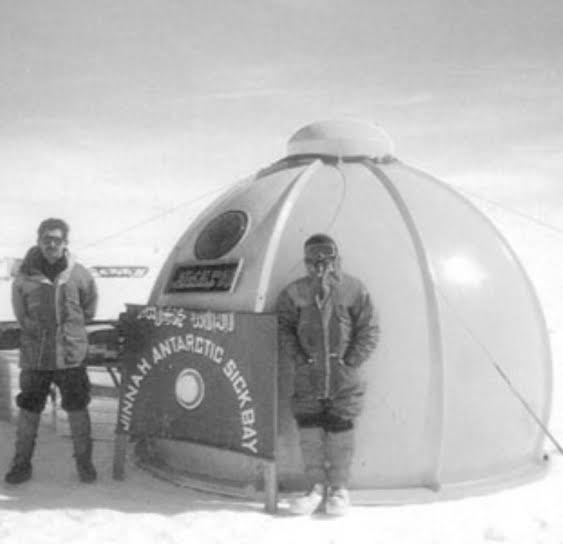The Jinnah Antarctic Station (JAS) is an Antarctic scientific research station operated by the Pakistan Antarctic Programme. It is located near the Sør Rondane Mountains, Queen Maud Land in East Antarctica. Antarctica is earth’s southernmost continent that contains the geographic South Pole and is situated in the Antarctic region of the Southern Hemisphere.
Antarctica is the fifth largest continent about 98 per cent of continent is covered by ice. Continent Antarctica is home to multiple purpose research deliberation from across the globe and Pakistan also has a presence there.
History
Pakistan Antarctic Programme abbreviated, as PAP is a scientific administrative division of the Ministry of Science and Technology (MoST) which represents the Government of Pakistan in Antarctica.
This program is joint venture and is financed by Pakistan Science Foundation and the Ministry of Science and Technology.
Pakistan became the first country in the Islamic world to send its expeditions to the Antarctic with its top scientists and logistic personals.
PAP administers and manages two polar stations in the region: the first one is Jinnah Antarctic Station (JNS), and the second is Polar Research Cell (PRC). Pakistan also has an automatic weather station called Iqbal Observatory on Sor Rondane Mountain.
Pakistan became signatory of the Scientific Committee on Antarctic Research (SCAR) in 1991. The programme was initiated by the National Institute of Oceanography with the full support of the Ministry of Science and Technology. Pakistan became an Associate Member of the Scientific Committee on Antarctic Research on 15 June 1992.
In 1991, the Jinnah Antarctic Station was established. Pakistan maintains one summer research station and one weather observatory near the Sør Rondane Mountains.

Role of Pakistan Navy
Pakistan Navy played an integral role in this program. Pakistan Navy spearheaded the whole program in general. PN provided the logistical support for the Mission. Pakistani naval engineers and scientists oversaw the development of the whole base.
All the equipment necessary for the operation of the base was provided by the Pakistan Navy. 1994 it was a comfortable, technologically advanced operational base. In 2001, the data operational system was linked to the Badr-B satellite; it started its regular transmission of digital imagery of the region to National Institute of Oceanography (NIO) headquarters in Karachi.
Role of PAF
PAF also played a crucial role in the development of this base. In 2005, one small airstrip was constructed by engineers of PAF. A control room was also established to monitor flights to and from Pakistan.
In 2010, Pakistan’s government approved a plan to expand the JAS facility into a permanent operational base. The Jinnah Antarctic Station is the center of most operations, and travel to and from Antarctica is done through the airfield at the JAS.
Role of SUPARCO
In 2002, SUPARCO scientists visited the base, where they set up and installed an advanced, supercomputer-equipped facility, run by the NIO and SUPARCO’s scientists.
Foreign Cooperation
JAS is a very important center in the region, and it is frequently visited by US scientists. Pakistani scientists and US scientists conduct their scientific research at the center.
Better communications links were established between JAS and the American Antarctic Program.
In recent times, Pakistani scientists have also participated in Chinese expeditions in Antarctica.
Reactivation of the Program
After initial successes, this initiative faced many setbacks, and this mission came to a halt due to lack of attention by Pakistani government and lack of funds. “Scientific research in Antarctica is a future investment for any government that offers manifold opportunities and benefits technologically, economically and even diplomatically, Pakistan’s Antarctic Programme is more than just a national achievement as it offers long-term benefits, elevates the country’s status and helps improve local expertise and technology.” Dr Hina Baig gave the above statement while talking to reporters.
In the year 2012, Pakistan wanted a Permanent base, which could handle full-fledged operations and would help the scientists and researchers to carry out their work all year round.
During the fourth round of bilateral political talks between Pakistan and Argentina, Pakistan raised this matter of reactivating its Antarctic program.
Pakistan not only wants to reactivate its Antarctic programme but also wants to undertake more research expeditions to Antarctica by Pakistani experts with the help and support from Argentina.
Benefits of Antarctic Research Center
Pakistan wants to use its infrastructure at JAS to do scientific research on the below mentioned areas.
- Oil and gas.
- Hydrographic surveys.
- Seabed mineral resources.
- Extraction of pure compounds.
- Freshwater reserves.
- Exploitation of living and non-living resources
- Global warming and environmental studies
- International laws related to Antarctica, rules and conventions and the rights and obligations that evolve from them.
Pakistan’s mission is focused on
- To undertake multidisciplinary research and survey in the Antarctic region particularly in the field of geoscience, glaciology, atmospheric dynamics, understanding climate change, polar ecosystems, fisheries, food web, polar biology, environmental science, cold adaptability of human beings and medicines as well as biogeochemical fluxes of carbon, nitrogen, silica and iron in the Southern Ocean and its influence.
- To take part in international scientific collaboration in the Antarctic region.
- To encourage the new generation of polar scientists, engineers, and leaders to provide relevant technical information to the government for appropriate decision making at the national and international level.
#MetalFalcon
#TeamPakistanStrategicForum






